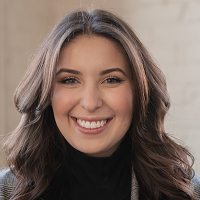When I tell people that I am a geropsychologist (a psychologist who specializes in geriatrics), I usually receive one of three responses: 1) I need you to diagnose my relative, 2) Wow, that sounds really hard, or 3) I thought older people don’t believe in therapy.
The third response—that older people don’t believe in therapy—is an interesting one for me, because I also believed this at the beginning of my career. As a millennial, a generation notorious for speaking openly about mental health, I assumed most of my interactions with older adults about psychotherapy would be an uphill battle. In graduate school, I had many conversations with professors about how I might create a professional relationship with an older adult client who had no interest in speaking with me or was biased against mental health treatment.
Fast-forward several years, I have now worked within many settings, including short-term rehabilitation, long term care, outpatient mental health and hospice care. To my initial surprise, typically when I offer my services to an older person, I am met with openness and gratitude.
More often than not, older adults are happy to have a space where they can talk about and process their challenges, joys, grief and adjustments. I think of one client in particular, a 95-year-old military veteran, who mentioned that this was the first time he’d engaged in therapy. He wanted to learn coping skills to manage his anxiety. When I asked what brought him in now, he said, “I figured I would try it out.”
Despite my positive experiences, it’s true that older adults are less likely to be in therapy than younger ones. According to the National Health Interview Survey, in 2019 just 5.7 percent of those who were 65 or older had had counseling or therapy during the last 12 months, compared to 11.6 percent who were between 18 and 44, and 9.1 percent who were 45 to 64.
If older people are as open to therapy and counselling as I’ve found them to be, why aren’t more of them getting help? They do need it. Between 14 and 25 percent of adults over 50 in the United States are living with a mental health disorder, with the most common being depression and anxiety. Almost a quarter of deaths by suicide are among people 60 and over. Adjusting to losses, illnesses or disabilities, to being a caregiver or to other age-related stressors can be challenging without some extra emotional support.
Also, though it feels silly to mention, older adults do not become devoid of everyday stressors once they reach a certain age. They still may have fights with friends, worry about the future, and hope to change unhealthy behaviors.
Are seniors biased against getting treatment? In a 2022 study, 87 percent of older adults reported that they were comfortable discussing their mental health.
So we know that many older people need help and most are comfortable discussing that. Why then do so few participate in psychotherapy?
Here’s what I think:
Our health care system may be part of the reason more older adults aren’t getting the help they need.
Only about half of mental health providers accept Medicare. Psychologists who don’t participate in Medicare say that’s because the program offers comparatively low reimbursement rates. Psychologists want to be compensated adequately for their work, but that means many older adults can’t afford therapy.
I am thankful that I work within the Veterans Affairs health care system, which provides vets with free mental health services, including psychotherapy. In my work as a geropsychologist, I do not have to make difficult decisions about which insurances to accept.
Ageism can become a barrier to treatment.
Older adults are most likely to share their mental health struggles with their primary care provider. Some providers are ageist and believe, for example, that depression is a normal part of aging, and that most older patients have a poor prognosis. Based on those beliefs, these providers may not refer an older person for psychotherapy even though they would have made that referral for someone younger with the same symptoms.
What’s more, mental health providers themselves may not offer an older adult the most effective or demanding treatments because they assume the patient is frail and incapable of making significant changes or is not as cognitively sharp as someone younger.
Some mental health providers who make ageist assumptions don’t want to work with older clients.
Only 1 percent of psychologists specialize in geropsychology. Not all therapists or counselors need to do that in order to work effectively with older adults, but the reality is that many general training programs do not educate students about best practices with older adults. For example, in that age group, symptoms of depression can mimic symptoms of dementia, such as impaired concentration, mental slowness or difficulty thinking clearly. Without adequate training or specialization, older clients may not receive the proper diagnosis or treatment they deserve.
Responding to this situation, geropsychologist Regina Koepp, PsyD, founded the Center for Mental Health and Aging. Its website offers older people and their caregivers a nationwide directory that lists licensed mental health providers who specialize in working with older adults. And for those providers, the center offers continuing education in how to meet the needs of older clients.
Thinking about the barriers to treatment that older people face brings to my mind my 95-year-old client who just wanted to “try it out.” By the end of therapy, he was doing daily morning meditations and had involved his daughter in practicing with him. His anxiety symptoms had gone down significantly in relatively few sessions.
His parting words to me were that he “should have come sooner.” I am glad that his primary care provider listened to his concerns and made a timely and appropriate referral. I am grateful that when he finally made the decision to come in, I was there, as one of the few geropsychologists in the country. I am thankful he had his VA benefits and could access therapy easily and for free. My hope is that, as a society, we can make meaningful changes so that more people like him can “try it out.”

Anastasia Canell has a PhD in clinical geropsychology, a specialty that focuses on understanding and helping older people and their families. She has worked in hospitals, skilled nursing facilities and outpatient clinics, providing psychotherapy for individuals, groups and caregivers, and is currently employed as a dementia specialty care psychologist. She also does research and has written and spoken extensively about issues associated with aging, such as the way becoming an older person’s caregiver impacts young adults (18 to 25).



